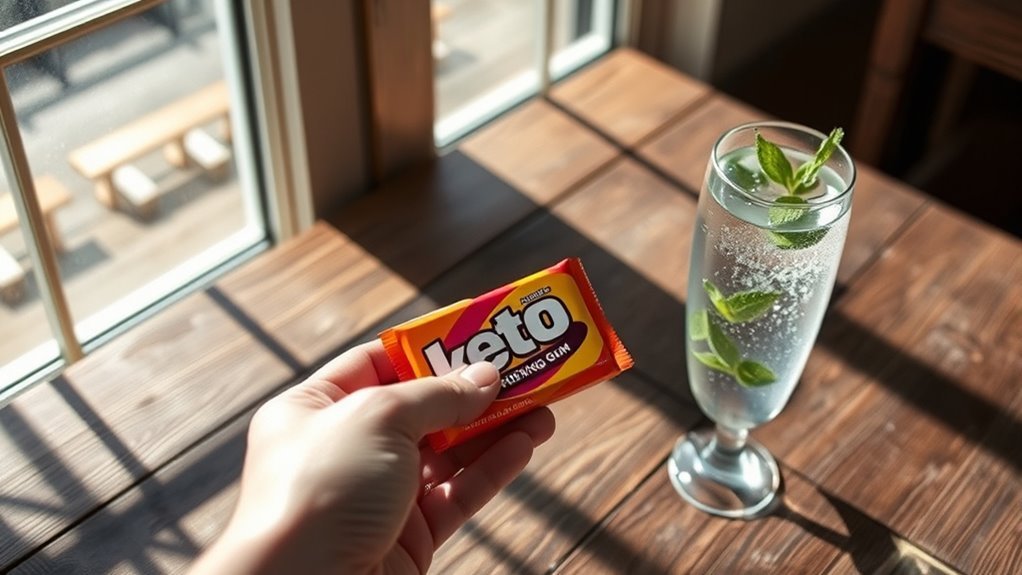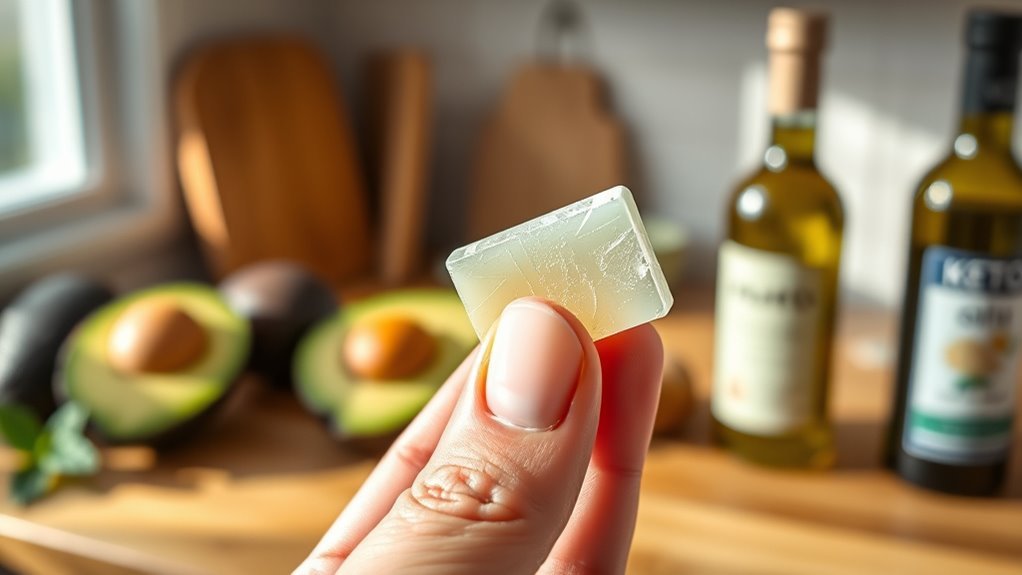Yes, you can chew gum on a keto diet, but it’s important to choose sugar-free options and keep an eye on the carb content. Most sugar-free gums have about 2-3 grams of carbs per serving, which can fit within your daily limit. Be cautious of certain sweeteners that might impact your ketosis, and remember moderation is key. If you want to make the best choices for your diet, there’s more you should know.
Understanding the Keto Diet and Carbohydrate Limits

When you’re considering the keto diet, it’s essential to understand its focus on low carbohydrate intake. The primary goal is to shift your body into ketosis, where it burns fat for fuel instead of carbs. To achieve this, you’ll need to track your keto macros, typically aiming for about 70% fat, 25% protein, and only 5% carbs. This translates to roughly 20-50 grams of net carbs per day, depending on your individual needs. Carb counting becomes vital; it helps you stay within these limits and maintain ketosis. By keeping an eye on your carb intake and adjusting your meal choices accordingly, you can experience the freedom that comes with effective weight management and increased energy levels.
The Role of Chewing Gum in Diet

Chewing gum can play a unique role in your diet, especially when you’re following keto. Opting for sugar-free gums can help satisfy cravings without greatly impacting your carbohydrate intake. However, it’s essential to monitor how even sugar-free options affect your ketosis levels, as some ingredients may have unexpected effects.
Sugar-Free Options Available
Choosing sugar-free gum can be a smart addition to your keto diet, as it typically contains minimal carbohydrates and calories. Many sugar substitutes, like xylitol and erythritol, are used in these gums, making them a guilt-free option for those on a low-carb plan. You’ll find a variety of gum flavors, from classic mint to fruity options, ensuring there’s something to satisfy your taste buds. These sugar-free options can help curb cravings and freshen your breath without derailing your dietary goals. However, be mindful of how much you consume, as excessive chewing might lead to digestive discomfort. Overall, sugar-free gum can be a convenient and enjoyable part of your keto lifestyle, offering both freedom and flavor.
Impact on Ketosis Levels
While you might think that chewing gum has little impact on your ketosis levels, it’s important to understand how even sugar-free options can affect your body. Many sugar-free gums contain sugar alcohols like xylitol or erythritol, which can influence your blood sugar and insulin levels, potentially affecting your state of ketosis. The chewing impact also leads to increased saliva production, which can stimulate your digestive system. For some, this may enhance cravings for carbs, making it harder to stick to your diet. Ultimately, moderation is key. You can enjoy gum occasionally, but be mindful of the ingredients and how they affect your overall keto journey. Staying informed empowers you to make choices that support your ketosis goals.
Types of Gum: Sugar-Free vs. Regular

When choosing gum on a keto diet, you’ll find that sugar-free options can offer benefits like fewer carbs and no added sugars. On the other hand, regular gum often contains sugar, which can spike your insulin levels and hinder your keto goals. Understanding these differences is key to making an informed choice that aligns with your dietary needs.
Sugar-Free Gum Benefits
Though many people enjoy chewing gum for its flavor and breath-freshening properties, the type of gum you choose can greatly impact your ketogenic lifestyle. Sugar-free gum offers several advantages, especially for those on a keto diet. First, it usually contains fewer calories and carbs compared to regular gum, aligning better with your dietary goals. Additionally, sugar-free gum often includes sweeteners like xylitol or erythritol, which provide gum flavor without the insulin spike associated with sugar. This means you can enjoy a revitalizing chew without compromising your ketosis. Plus, chewing sugar-free gum can help curb cravings and promote oral health. So, when selecting gum, opting for sugar-free varieties can support your keto journey while keeping your breath fresh.
Regular Gum Risks
Choosing the wrong type of gum can pose risks to your keto diet, especially if you opt for regular gum loaded with sugar. Regular gum often contains high sugar levels, which can spike your insulin and kick you out of ketosis. Here are some potential risks to take into account:
- High Calorie Content: Regular gum can add unnecessary calories to your daily intake.
- Sugar Ingredients: Ingredients like corn syrup and cane sugar can sabotage your keto goals.
- Increased Cravings: The sweet taste can trigger cravings for more carbs.
- Digestive Issues: Some gum ingredients may lead to bloating or digestive discomfort.
Being mindful of gum ingredients and calorie content is essential for maintaining your keto lifestyle without compromising your progress.
Analyzing Carb Content in Popular Gum Brands
While many people on a ketogenic diet might crave the fresh taste of chewing gum, it’s vital to analyze the carb content in popular brands to confirm they fit within your daily limits. Gum brand comparisons show that not all gums are created equal. For instance, sugar-free options often contain fewer carbs, but it’s still important to check the label. Brands like Trident or Orbit typically have about 2-3 grams of carbs per serving, which can add up if you chew multiple pieces. On the other hand, some specialty keto-friendly gums may have negligible carbs. Conducting a thorough carb content analysis will help you make informed choices, ensuring your gum-chewing habit aligns with your ketogenic goals while still enjoying that invigorating flavor.
Artificial Sweeteners: Impact on Ketosis
When evaluating gum options on a keto diet, it’s important to examine not just the carb content but also the type of sweeteners used. Different artificial sweeteners can have varying effects on ketosis maintenance. Here are some key points to contemplate:
- Net Carbs: Some sweeteners may still contribute to your daily carb intake.
- Insulin Response: Certain sweeteners can trigger an insulin response, potentially affecting ketosis.
- Gut Health: Some artificial sweeteners may disrupt gut bacteria, influencing overall health.
- Personal Tolerance: Everyone reacts differently; monitor how your body responds.
Understanding these artificial sweeteners effects can help you make informed choices while enjoying your gum, allowing you to maintain that sought-after freedom on your keto journey.
Benefits of Chewing Gum on Keto
Chewing gum can offer several benefits on a keto diet, especially if you choose options with minimal net carbs. One significant advantage is its ability to freshen your breath, which can be particularly helpful when you’re adjusting to the keto diet’s effects. Additionally, gum can aid in appetite control by keeping your mouth busy and reducing cravings.
| Benefit | Description | Example |
|---|---|---|
| Freshens Breath | Helps mask bad breath often associated with keto | Sugar-free mint gum |
| Appetite Control | Keeps your mouth occupied, reducing cravings | Chewing gum during meals |
| Low Calorie Snack | Satisfies the need to chew without added carbs | Keto-friendly gum options |
| Oral Health | Stimulates saliva, promoting dental health | Xylitol-containing gum |
Potential Drawbacks of Gum Consumption
Although gum can provide certain benefits on a keto diet, it also has potential drawbacks that are worth considering. Here are some issues to keep in mind:
- Sugar Alcohols: Many sugar-free gums contain sugar alcohols, which can lead to digestive issues like bloating or diarrhea if consumed in excess.
- Oral Health: Overconsumption of gum may cause jaw pain or discomfort, potentially affecting your oral health.
- Additives: Artificial sweeteners and flavors could trigger cravings or disrupt your keto journey.
- Calories: While low, the calories in gum can add up if you’re not careful, impacting your overall caloric intake.
Being aware of these drawbacks allows you to enjoy gum while making informed choices that align with your keto goals.
Alternatives to Chewing Gum for Fresh Breath
If you’re looking for ways to maintain fresh breath without relying on gum, there are several alternatives worth considering. Breath mints can provide a quick fix, while essential oils like peppermint or tea tree can be diluted with water for a revitalizing rinse. Herbal teas, particularly those with mint or fennel, are another great option. You might also explore mouthwash alternatives, such as apple cider vinegar mixed with water. Flavored water can keep your palate invigorated, and munching on fresh fruits or crunchy vegetables like carrots can help cleanse your mouth naturally. Sugar-free candies can satisfy your sweet tooth without added carbs. Finally, chewing herbs like parsley or using coconut oil for oil pulling can promote a fresh and healthy mouth.
Making Smart Gum Choices on a Keto Diet
When you’re on a keto diet, how can you enjoy gum without jeopardizing your carb intake? Making smart choices is key. Here are four tips to help you select the right gum:
- Look for Keto Friendly Brands: Brands like XyloSweet and Simply Gum are great options.
- Check the Ingredients: Verify they use sugar substitutes like erythritol or stevia.
- Pay Attention to Serving Size: Stick to one or two pieces to keep carbs low.
- Explore Gum Flavor Varieties: Enjoy different flavors like peppermint, cinnamon, or even fruit-infused options to keep it exciting.
Frequently Asked Questions
Can Chewing Gum Help With Cravings on Keto?
Chewing gum can be a helpful tool for craving control when you’re on a keto diet. It often contains sugar substitutes like xylitol or erythritol, which can satisfy your sweet tooth without kicking you out of ketosis. These substitutes might help you manage cravings for sugary snacks and keep you focused on your dietary goals. However, moderation is key; too much gum can lead to digestive issues, so find a balance that works for you.
Does Gum Affect Hydration Levels While on Keto?
Picture yourself savoring a piece of gum, its sweetness bursting in your mouth while you navigate your keto journey. While gum can stimulate saliva production, helping with keto oral health, it doesn’t directly affect hydration levels. However, if you’re relying on gum to curb cravings, remember to drink water to stay hydrated. Balancing gum consumption with proper hydration guarantees you maintain both oral health and keto success. Keep your freedom intact while enjoying each chew!
Are There Any Side Effects of Chewing Gum on Keto?
Chewing gum can have some side effects on keto, especially if it contains sugar substitutes. While many sugar-free gums are low in calories, some may still contain carbs that could affect your ketosis. Additionally, excessive chewing might lead to digestive issues like bloating or gas due to the artificial sweeteners used. It’s important to check the calorie content and ingredients before indulging, so you can enjoy your gum without compromising your keto goals.
How Much Gum Can I Chew Without Affecting Ketosis?
When it comes to how much gum you can chew without affecting ketosis, focus on the gum’s carb content. Sugar-free options are typically lower in carbs and can be enjoyed in moderation. Generally, sticking to one or two pieces a day should keep you within your carb limits. However, always check the nutrition label, as some brands may contain higher carb counts that could impact your ketosis goals. Enjoy your gum wisely!
Is There a Recommended Brand of Gum for Keto?
When choosing a brand of gum suitable for your keto lifestyle, look for sugar-free options. Brands like Xylichew and PUR Gum are popular, as they typically use natural sweeteners like xylitol or erythritol, which won’t spike your blood sugar. Always check the gum ingredients for any hidden carbs or sugars. This way, you can enjoy fresh breath without compromising your dietary goals while keeping your keto journey enjoyable and freeing.
Frequently Asked Questions about Chewing Gum on Keto
1. Can I chew gum while following a keto diet?
Yes, you can chew gum while on a keto diet. However, it’s essential to choose sugar-free gum to avoid any added sugars that could kick you out of ketosis. Look for gum sweetened with alternatives like xylitol or erythritol, which are keto-friendly and low in carbohydrates.
2. Will chewing gum affect my ketosis?
Chewing sugar-free gum in moderation is unlikely to affect your ketosis significantly. Most sugar-free gums contain fewer than 1-2 grams of carbs per piece, which is generally manageable within a keto diet. However, be cautious of consuming multiple pieces, as the carbs can add up.
3. What types of gum are best for a keto diet?
The best types of gum for a keto diet are those that are labeled as sugar-free and contain low-carb sweeteners like xylitol, erythritol, or stevia. Brands specifically designed for low-carb or keto diets may also offer gum with additional benefits, such as added fiber or vitamins.
4. Can chewing gum help curb cravings on keto?
Yes, chewing gum can help curb cravings on a keto diet. The act of chewing and the flavor of the gum can distract you from hunger and reduce the urge to snack. However, it’s important to ensure that the gum you choose does not contain any hidden sugars or high-carb ingredients.
5. Are there any side effects of chewing gum on a keto diet?
While chewing gum itself is generally safe, excessive consumption can lead to digestive issues such as bloating or gas, especially if the gum contains sugar alcohols like sorbitol or maltitol. Additionally, some people may find that artificially sweetened gum triggers cravings for sweets, which could be counterproductive on a keto diet.
References
- https://www.healthline.com/nutrition/keto-diet-and-gum
- https://www.medicalnewstoday.com/articles/can-i-chew-gum-on-keto
- https://www.wellandgood.com/chewing-gum-keto/
- https://www.dietdoctor.com/low-carb/keto/faq
- https://www.ncbi.nlm.nih.gov/pmc/articles/PMC6518754/
- https://www.sciencedirect.com/science/article/pii/S2212267216300077
- https://www.ketogenic.com/chewing-gum-on-keto/
- https://www.mayoclinic.org/healthy-lifestyle/nutrition-and-healthy-eating/expert-answers/chewing-gum/faq-20058520
- https://www.nutrition.gov/topics/nutrition-101/chewing-gum-and-health


